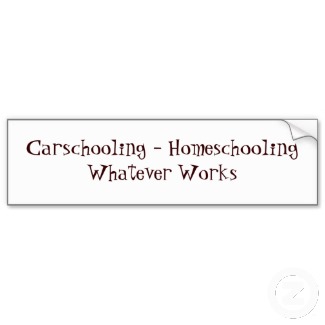 Let’s take a look at another approach to homeschooling. Doing “school-at-home” is what many people picture when they hear the word homeschooling. Some of the characteristics of school-at-home include:
Let’s take a look at another approach to homeschooling. Doing “school-at-home” is what many people picture when they hear the word homeschooling. Some of the characteristics of school-at-home include:
- children gathered around the kitchen table or at desks in a specified "school room" in the home with a parent instructor
- generally one of the more expensive ways of homeschooling due to buying large amounts of curriculum sets which typically include textbooks, study schedules, grading requirements, and record keeping guides
- generally one the most difficult ways to homeschool due to trying to follow the set curriculum with multiple ages
- typically very easy for first time homeschooling parent because most of the planning is done
- this type of homeschooling will require the teacher/parent to do a lot of preparation work for each lesson
I would like to give you a little glimpse into one homeschool journey. This family uses an altered version of school-at-home:
1. What would you state is your homeschooling style and why?
I was a public school teacher, so I basically do public school at home. We use a public school curriculum (McGraw Hill), but move at a faster pace, school year round, and include extra subjects, like Rosetta Stone Spanish. Plus, I like the fact that this curriculum teaches all three types of learners. If I ever have to put my son in public school, I want him to be familiar with the teaching style.
2. What does an average school day look like for you?
My son has a sleep disorder, so we don't do school at a certain time each day, but we do follow a set routine. First, we have calendar time, where we review the day of the week, date, month, year, tell time, count money, graph the weather type and temperature, and review place value. Second, we do math. We use manipulatives to explore the new skill and then he learns to express the concept with numbers and symbols. There is an emphasis on word problems and choosing the operation. Third is reading. I read a book to him that focuses on a concept we've been studying or a holiday that is approaching. This book is above his grade level. After we discuss it, he reads aloud from a separate reader. Reading is concluded with learning a new skill, discussing it, reading selections that emphasize the new skill, and completing a few worksheets on the skill. Fourth, he writes about a topic. It either has something to do with what we read, focuses on a skill, or is a journal topic of his choosing. There is an emphasis on spelling and handwriting, as well as quality of expression. These writings are usually illustrated, but not always. Fifth, we either do health, science, or social studies. We rotate through these subjects doing a unit from each one. This time may consist of an experiment, an observation, a reading selection, a discussion, or any combination of the above. Often worksheets are completed to demonstrate leaning. We close with Spanish, art, or music. Spanish occurs more often than the other two. Spanish is a Rosetta Stone done on the computer. Art is a holiday craft or a lesson on an art concept, followed by an art project during which he can experiment with the learned concept. Music began with a study of instruments in which we read about an instrument, listened to works emphasizing the instrument, watched YouTube videos of people playing the instruments, and wrote about it. Having completed all the instruments, he is preparing to learn to read music and play the piano and guitar. Gym is done two or three times a week. He gets a lot of activity as a normal part of his play, but we like to try to focus on a skill as often as possible. He takes gymnastics, is getting ready to begin ballroom dancing, practices golf and fishing with his father, is working on new swimming skills with me, and has a trampoline, a bike, a scooter, and playground equipment. We often take walks with friends. Socialization is also very important. We get together with other kids approximately three times a week, more often in the nice weather. We are members of a homeschool support group and a mommy and me play group. We have park play dates, gatherings at our homes, potluck luncheons, restaurant dining experiences, group field trips, and much more. He has interaction with adults and kids of all ages and backgrounds because that is what real life socialization is like. We school year round and are generally “on” for three weeks and “off” for one. This provides him with plenty of down time, but doesn’t involve any breaks long enough to allow forgetting to occur.
3. What resources do you utilize outside of your home for educational purposes?
I believe that learning should be reinforced with real-life experience whenever possible. We utilize all area resources. We took trips to Natural Bridge and the beach after our unit on rocks, weathering, and erosion. We traveled to Safari Park and Natural Bridge Zoo after our unit on animals. We observed in the Emerald Isle Aquarium after completing a unit on ocean life. We visited the White House, Capitol Building, and D.C museums after our units on government and prehistoric times. We took a hike on a tree trail after our unit on plants. We toured a cabinet factory to conclude an economics unit on goods and services. We are members of two different co-ops. We take field trips with them. They know us by name at the library.
--
Visit Jessica's previous homeschool posts: Home Education: Deciphering the Information



